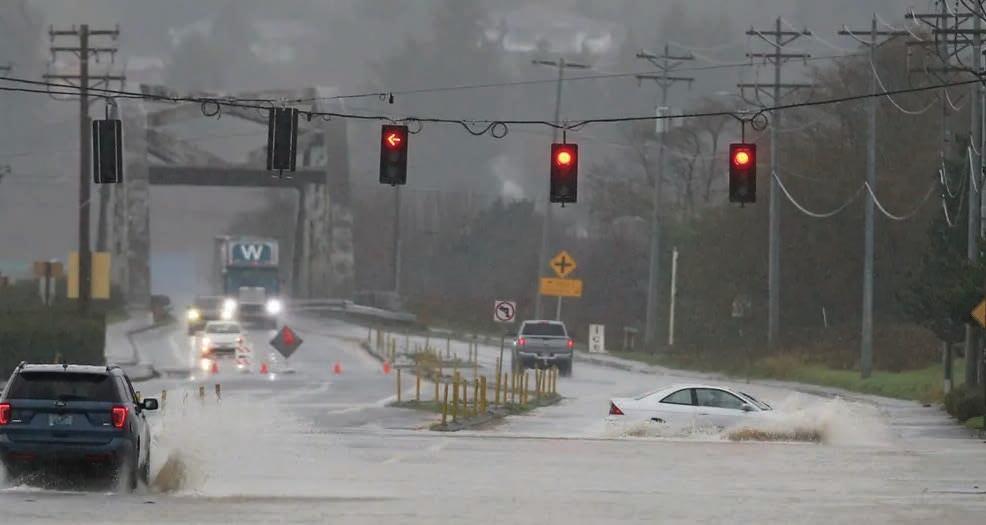
WEDNESDAY, MARCH 19, 2025


WEDNESDAY, MARCH 19, 2025
By: Charles Hudson
John Oliver Riccio, doing business as the Grants Pass Tribune, has filed a tort complaint against Josephine County, and Commissioner Chris Barnett, accusing him of new and ongoing unlawful interference with business operations, defamation, and First Amendment violations. This case has sparked serious ethical concerns regarding the misuse of public office for personal gain, and it threatens to expose the county to additional legal action. At the heart of the dispute is Riccio's allegation that Barnett is driven by a personal vendetta against a local media outlet, further complicating the legal and ethical landscape for the county.
The claim, filed under Oregon Tort Claims Act and supported by multiple allegations of unethical conduct, outlines a series of actions allegedly taken by Barnett that resulted in both financial harm and reputational damage to the plaintiff's business, Grants Pass Tribune. According to the complaint, Barnett, in his official and personal capacity, engaged in deceptive business practices and manipulated public opinion through the creation of fraudulent social media pages and the unauthorized use of the "Grants Pass Media" name.
Barnett created a fraudulent social media account under the name "Grants Pass Media" on January 24. The plaintiff claims that Barnett’s actions were aimed at confusing the public and mimicking the branding of the plaintiff's busi-
ness. In addition, Barnett is accused of engaging in copyright infringement by reproducing a published article without permission and using his political influence to block potential advertisers from working with the Grants Pass Tribune.
One of the most troubling allegations is that, despite receiving a second cease-and-desist letter from the plaintiff just days later, Barnett continued to operate and even doubled down by creating a competing media outlet called "Josephine County Tribune." The name closely mirrors that of the Grants Pass Tribune, leading to confusion among the public. The complaint claims that this new outlet was developed using county resources, including staff and equipment, and launched immediately after Barnett was warned about his actions. Additionally, the plaintiff alleges that Barnett abused his position to interfere with business relationships, causing the loss of advertising revenue and ongoing damage to the plaintiff's media business.
Beyond the accusations of business interference, the plaintiff also claims that Barnett's actions violated his First Amendment rights. The suit alleges that Barnett blocked and deleted or hid public commentary that criticized his political views on official county social media platforms, which is seen as a violation of Oregon's public records law. The plaintiff argues that Barnett's behavior has stifled free speech and fair representation, using his position to promote his personal business while limiting the media’s

ability to operate freely.
Furthermore, the complaint accuses Barnett of ethical violations, including conflicts of interest and abuse of office. The complaint highlights instances where Barnett allegedly used his access to confidential county information for personal profit, as well as his involvement with individuals accused of defamation. The plaintiff claims that Barnett’s association with these individuals, including those currently engaged in legal defamation battles, further exemplifies his malicious intent.
The plaintiff is seeking damages totaling $701,300, the statutory cap on liability for local public bodies under Oregon law. The complaint also requests corrective action, including the removal of all fraudulent media pages, a public apology from Barnett, and an official investigation into the ethical violations allegedly committed by the commissioner.
As this legal battle unfolds, the controver-
sy surrounding Barnett’s actions raises serious concerns about the misuse of power and resources within the county government. The plaintiff’s accusations suggest that Barnett may have used his political position for personal gain, undermining the integrity of local media and threatening the ability of journalists to operate without interference.
Josephine County is now facing the possibility of further legal ramifications. If the county fails to take corrective action, the plaintiff has warned that a lawsuit will be filed against both the county and Commissioner Barnett. The situation remains fluid, and how the county addresses the issue could have lasting implications for both its governance and the local press. The case underscores the broader question of how public figures, particularly elected officials, can use their power to impact the media landscape, potentially setting a dangerous precedent for the future.
By: Leaf Barret
Last week’s heavy rainstorms in Southern Oregon, including the Grants Pass area, offered a stark reminder of the region's vulnerability to weather extremes and the unpredictable forces of nature. The downpour, which led to localized flooding and significant rainfall accumulation, highlighted the ongoing reality of climate variability in the Pacific Northwest. As communities recover and reflect on the event, the pressing question arises: Will we be ready for the next round of storms and potential flooding?
Southern Oregon, known for its lush landscapes, mountainous terrain, and proximity to the Rogue River, is no stranger to periods of heavy rain and the associated risks. The area’s topography, with steep slopes and rapid river systems, can amplify the effects of rainfall. This particular storm was no exception, as rainfall totals in some areas exceeded the typical monthly average, with certain regions seeing several inches of rain in just a few days. Localized flooding led to road closures, disrupted travel, and even forced some residents to temporarily evacuate homes due to the rising waters.
Experts have long pointed to climate change as a driving factor in the increased frequency and intensity of such storms. While it is

difficult to directly attribute any single weather event to climate change, scientists agree that warmer temperatures are leading to increased moisture in the atmosphere, which results in more intense rainfall events. In Southern Oregon, these trends are becoming more evident, and communities are being urged to adapt to the realities of an ever-changing climate.
For residents of Grants Pass and the broader region, the recent rain was not just a wakeup call but an opportunity to reassess preparedness for future storms. Flooding remains
one of the most immediate threats during the winter months, and as more severe weather events become commonplace, it is essential to understand the risks and take proactive steps to reduce vulnerability.
One of the most practical and cost-effective preparations is to invest in sandbags. These simple yet effective barriers can help divert water away from homes and prevent flooding in vulnerable areas. Local authorities often provide sandbag stations during periods of heightened flood risk, but it is wise for property
owners to have their own supply on hand before the next storm hits. Storing sandbags and placing them strategically around doorways, windows, and other potential entry points can provide a critical defense against rising waters. Another important step is to ensure proper drainage systems are in place. Homeowners should clear gutters, downspouts, and storm drains of debris to allow for the free flow of water. Blocked drains can exacerbate flooding by causing water to back up, potentially flooding basements and lower-lying areas. If a property is located in a known flood zone, it may be worthwhile to invest in a sump pump, which can help remove water that accumulates in basements or crawl spaces.
For those living near rivers or streams, understanding floodplain mapping and potential flood risks is essential. The Rogue River, for ex-
• see HEAVY, page 3


















By: John Oliver
Oregon’s current legislative session has introduced three important bills—Senate Bills 819, 820, and 821—that aim to reform how the state manages sex offender classifications and reporting requirements. These bills, introduced in response to a significant backlog of unclassified sex offenders, have sparked debates over public safety, administrative efficiency, and the protection of vulnerable communities. While the state seeks to address the logistical challenges of sex offender registration, the potential consequences of these reforms could have lasting effects on public safety. This situation underscores the critical need for Oregon residents to educate themselves and actively voice their concerns to ensure their interests and safety are represented.
The proposed Senate Bills 819, 820, and 821 focus on revising the current system of classification for registered sex offenders. Each bill introduces key changes to how sex offenders are assessed, classified, and monitored, with an eye toward streamlining processes and clearing a significant backlog. However, these proposed changes also raise concerns about potentially reducing oversight, compromising public safety, and shifting focus from rehabilitation to procedural efficiency. As the bills continue to move through the legislative process, it’s crucial for Oregonians to understand the broader implications of these measures and actively engage in the ongoing conversation.
Senate Bill 819 proposes giving the State Board of Parole and Post-Prison Supervision, as well as the Psychiatric Security Review Board, the authority to administratively review and adjust sex offender risk classifications and relief from reporting requirements. These decisions would occur without requiring a hearing, a change designed to expedite the process. While advocates for the bill argue that it could help manage the growing backlog of unclassified sex offenders, critics worry it could lead to hasty decisions without

proper scrutiny, potentially placing communities at risk.
Oregon residents must understand that the intent to simplify the classification process should not come at the expense of thorough assessments. The risk of reduced public hearings means that cases with complex histories may not receive the attention they deserve. This raises the question: how can Oregonians ensure that safety isn’t sacrificed for administrative convenience?
Senate Bill 820 introduces another significant shift, focusing on the classification of sex offenders convicted before 2014. It proposes that sex offenders will be classified into risk levels only under specific circumstances, such as if the offender has multiple convictions or is nearing release. Proponents argue that this targeted approach will help the Parole Board allocate resources efficiently, concentrating on higher-risk individuals.
However, this bill has ignited concerns from victim advocacy groups, who fear that reducing the number of assessments could result in fewer offenders being monitored, leaving communities vulnerable. Moreover, the bill might prioritize efficiency over justice, potentially glossing over important details that could influence the assessment of lower-risk offenders who may still pose a danger to society.
Oregonians must be aware of the potential for these changes to alter how offenders
are monitored after serving their sentences. While focusing on higher-risk offenders is important, the public must ask: how will the state ensure that those with lesser offenses but still significant risks are not overlooked in this more streamlined system?
Senate Bill 821 proposes to eliminate the deadline by which the Parole Board must assess all sex offender registrants. It also seeks to repeal a provision that mandates biennial reports to the legislature regarding these assessments. This bill’s intent is to allow the Parole Board more flexibility in how it allocates resources, potentially reducing pressure to meet strict timelines.
The danger in this proposal is that without a clear timeline for assessments, there could be delays in classifying offenders and monitoring their behavior. Without ongoing updates and checks on the classification system, it’s possible that high-risk offenders may be left unchecked for longer periods. This bill highlights the ongoing tension between administrative flexibility and the need for timely action to protect communities.
As these three bills continue to be debated, it becomes increasingly clear that the fate of Oregon’s sex offender management system will have profound consequences for public safety. The decisions made in the legislature will impact the way offenders are classified, monitored, and held accountable for their actions.
ample, has experienced significant flooding in the past, and residents living near its banks are at increased risk. The National Weather Service and other local agencies often issue flood warnings ahead of time, and understanding the flood history of one’s property can provide valuable insight into whether additional steps, such as raising the foundation of a home, might be necessary.
Beyond physical preparations, community-wide efforts to address stormwater management and flood control infrastructure are also critical. Local governments and organi-
zations are continuously working to improve drainage systems, build levees, and restore wetlands to absorb excess water. However, these large-scale efforts take time and require community involvement. Residents are encouraged to participate in local planning initiatives and stay informed about developments in flood prevention measures.
The rainstorm that impacted Southern Oregon last week serves as a reminder that, regardless of where we live, Mother Nature is still in charge. It’s easy to overlook the power of natural systems, especially as modern
infrastructure often shields us from their full impact. But with climate change reshaping weather patterns, it is crucial to recognize the risks and take practical steps to prepare. From storing sandbags to ensuring proper drainage and staying informed about flood risks, every action taken today can make a difference tomorrow.
As Southern Oregon braces for more winter storms, the question remains: Will you be ready? The time to prepare is now.
For residents of Oregon, this is a critical moment to ensure that their voices are heard. While legislative bodies are working to resolve a complex issue involving sex offender classification, the public must take an active role in advocating for policies that balance fairness with safety. Public hearings have already been held, and continued participation is essential to ensure that all perspectives are considered. Oregonians must be well-informed about the potential impacts of these bills and recognize that the decisions made by lawmakers will directly affect their families, communities, and the safety of their neighborhoods. Whether through attending public hearings, contacting their elected representatives, or participating in community forums, Oregonians have a responsibility to engage in the conversation. The outcome of these bills will shape the state’s approach to managing sex offenders for years to come. The residents of Oregon must understand that their input is invaluable in ensuring that the state’s policies reflect the needs and concerns of the people they serve. With the potential consequences of these bills so far-reaching, Oregonians cannot afford to remain silent. They must speak up, educate themselves, and advocate for a system that protects public safety without compromising justice or the rights of victims.
As the legislative session progresses, it is essential for the public to remain vigilant and proactive. Oregonians must stay informed about changes in the law and continue to voice their concerns to lawmakers. Only through collective action can the people of Oregon ensure that their communities remain safe while maintaining a fair and effective system of sex offender classification. The stakes are high, and now is the time for every Oregonian to make their voice heard.



By: John Oliver
The Biden administration has come under scrutiny following allegations that it intentionally suppressed a draft study that could have challenged its decision to pause approvals for liquefied natural gas (LNG) export projects. According to four sources within the U.S. Department of Energy (DOE), a final draft of the study, which explored the climate and economic impacts of LNG export growth, was buried before it could be made public.
In January 2024, then-Energy Secretary Jennifer Granholm and President Joe Biden announced that the administration would place a temporary freeze on LNG export project approvals. The pause was justified by the need for further analysis, with officials stating that the DOE would conduct a fresh study to evaluate the long-term climate and economic consequences of expanding LNG exports. This move was framed as an attempt to ensure that the U.S. energy policy would align with the administration’s climate goals, focusing on reducing carbon emissions and addressing the impacts of fossil fuel use on global warming.
However, reports from multiple DOE sources suggest that the draft version of the study, which was reportedly completed before the freeze was announced, could have undermined the basis for the LNG export moratorium. The study, which is believed to have been conducted by independent researchers within the DOE, had reportedly shown that increasing LNG exports would not have as significant an impact on the U.S. economy or its climate goals as the administration’s decision implied.
Sources familiar with the situation claim that despite the study’s completion, it was not released to the public or made available to lawmakers or industry stakeholders. Instead, the administration proceeded with the decision to halt LNG export approvals based on the premise that more research was needed to assess the potential risks and benefits of further LNG expansion.
The decision to pause LNG exports has been a point of contention for several industry groups, which argue that increasing the export of U.S. natural gas could help meet global

energy demands, particularly in Europe, where countries are seeking alternatives to Russian energy supplies amid the ongoing conflict with Ukraine. Proponents of LNG export growth contend that it would not only support economic growth and energy security but could also reduce global emissions by displacing more polluting coal and oil in other countries.
Critics, however, argue that increasing LNG exports would have adverse environmental consequences. They point out that the transportation and liquefaction processes involved in LNG production are energy-intensive and contribute to carbon emissions. Additionally, there is concern that expanding the U.S. LNG industry could encourage more fracking and fossil fuel extraction, further exacerbating climate change.
The alleged suppression of the study has raised questions about the transparency of the Biden administration's decision-making process. Some critics argue that the administration’s actions represent a form of political maneuvering—choosing to ignore research that contradicts its policy in favor of maintaining public support for its climate agenda. These critics have labeled the administration's actions as another example of what they term the "Biden curtain," suggesting that key decisions are being made behind closed doors, away from public scrutiny and with limited ac-
countability.
At the same time, some environmental groups have expressed concern that the freeze on LNG approvals might not go far enough. They argue that a true commitment to combating climate change would involve a much broader shift away from fossil fuels altogether, rather than simply slowing down the growth of the LNG export market.
The decision to pause LNG exports was part of a broader effort by the Biden administration to align U.S. energy policy with its climate goals. Under Biden’s leadership, the U.S. has re-entered the Paris Agreement and committed to reducing greenhouse gas emissions to net-zero by 2050. However, as the debate over LNG exports intensifies, the administration faces growing pressure from both industry advocates and environmentalists, all of whom demand clarity about the path forward for U.S. energy policy in a rapidly changing global landscape.
As of now, the draft study remains unpublished, and there has been no official statement from the Biden administration regarding its contents or the reasons behind its suppression. With energy policy continuing to be a central issue for the U.S. in the coming years, the handling of LNG export projects and related studies is likely to remain a key point of political and public debate.
Sean “Diddy” Combs, the renowned music mogul and entrepreneur, pleaded not guilty to an updated indictment during a hearing in Manhattan federal court on March 14, 2025. The new indictment builds upon previous charges that accuse the 55-year-old of sex trafficking, racketeering, and forcing individuals into prostitution. In the latest filing, federal prosecutors allege that Combs coerced employees into working long hours under threatening conditions, using physical force to manipulate at least one employee into engaging in non-consensual sexual acts.
The legal battle has been ongoing since Combs' arrest in September 2024, and he has been held at Brooklyn’s Metropolitan Detention Center since then. Prosecutors have argued for Combs’ continued detention, citing concerns about potential witness tampering and jury intimidation. They allege that Combs attempted to contact witnesses and jurors through oth-
er inmates, using third-party communication services to conceal his identity. This claim has fueled the decision to deny him bail on three separate occasions.
Despite the gravity of the charges, Combs’ defense team maintains his innocence, dismissing the allegations as baseless and part of a larger, politically motivated campaign. They assert that all sexual encounters were consensual and characterize the case as a “media circus” designed to tarnish Combs' reputation. The defense also argues that the charges lack sufficient evidence to support the claims.
Combs’ court date for the upcoming trial has been scheduled for May 12, 2025, with jury selection set to begin on May 5. The trial's timeline was determined after discussions between the prosecution and defense over scheduling, with the defense requesting a later date to allow more time for preparation.
The legal proceedings surrounding Combs are expected to have far-reaching implications,
particularly given the high-profile nature of the case. In addition to the criminal charges, Combs faces numerous civil lawsuits alleging sexual misconduct that spans two decades. These lawsuits include accusations of physical assault, coercion, and harassment. One of the most publicized cases involves a 2016 surveillance video showing Combs allegedly assaulting his former girlfriend, singer Cassie Ventura, in a hotel hallway. Combs later issued an apology, acknowledging that his behavior was “inexcusable.”
Combs’ legal team has not only denied all allegations of abuse but has also questioned the motivations behind the charges, suggesting that they are driven by political interests. With the upcoming trial, the entertainment industry and the public are closely watching how this case will unfold. Should the charges be proven true, they could seriously affect Combs’ career and public image, given his status as one of the most influential figures in the music business.

As the legal process moves forward, the trial is expected to reveal more details about the allegations against Combs, and it could set a precedent for how similar cases are handled in the future. The trial will likely attract significant media attention and could further fuel the ongoing debate surrounding power dynamics in the entertainment industry.

Advertise with The Grants Pass Tribune!
Stand with us in defending freedom of the press and the 1st Amendment! The Grants Pass Tribune is facing political persecution, with lawsuits aimed at silencing our bold investigative journalism. We remain committed to uncovering the truth and keeping our community informed like never before.
Show
The BCC Weekly - Taking the “Blind” out of the BCC
By: Jay Meredith, CPA Investigative Journalist
About 8 years ago local community members and community leaders gathered in the GP High Performing Arts Center to hear a fantastic presentation by Stephen M.R. Covey on the cost of trust in Leadership and Business. A low-trust work environment is a very costly and inefficient work environment. Covey is one of the world’s experts on this topic and Josephine County Commissioners (BCC) would do well to rush out and buy one or more of his books on the topic of trust as this high cost is playing out in Josephine County government as we speak.
Rather than take the Ronald Reagan approach of saying “The person who agrees with you 80 percent of the time is a friend and an ally,” many decisions by the BCC in recent months and years seem to stem from an attitude more like a “100% my way or the highway” type approach. In other words, many costly decisions have been made by the County Commissioners due to the low-trust environment that has been prevalent in the last couple years and continues to be perpetuated in 2025.
The 2024 recall of Josephine County Commissioner John West documented at least $6.4 million worth of increased costs and lost revenues that in my opinion were the result of such a lowtrust environment. The list that makes up this amount can still be seen on the fact sheet at www. recalljohnwest.com. Since developing this list, we now have well over $1 million in additional costs that have surfaced from questionable actions and decisions by Josephine County leadership.
If you were following local November elections and local candidates closely last fall, you know that County Commissioners and the former Coun-

ty Finance Director manufactured an accusation that former County Treasurer Eve Arce was withholding bank statements and trying to hide certain bank activity from the Finance Department. Certain local political operatives used this bogus allegation to smear a highly qualified treasurer that had been serving Josephine County faithfully for almost 30 years and had been the elected Treasurer since 2013. Now with a new and reportedly underqualified elected treasurer in office, another job position in the department had to be upgraded at an additional cost of about $30,000 more per year to retain the proper amount of expertise the department needs to do its job.
Taking this bogus allegation one step further, County officials, likely the County Commissioners, also authorized a secret audit to follow up on these bogus allegations in the Treasurer’s office. And public records recently received show that the secret audit cost paid to audit firm Moss Adams totaled $31,400. What did we taxpayers receive for this large audit cost? Likely nothing given this secret audit was completed at least a couple months ago and nothing has ever been said about the audit in public meetings. Not only that but any purchase or contract in excess of $25,000 is by County purchasing policy sup-
posed to be approved by all three commissioners and this one was never discussed in an open session of a public meeting.
Breaking the County’s $25,000 purchasing policy limit (the amount where all three Commissioners must approve) seems to be more commonplace lately. The recent crony hiring of former Commissioner Simon Hare by contract to be the County Budget Officer without even discussing it in a public meeting is another example of breaking standard County purchasing policy.
And while a records request is pending, it appears the BCC risked spending nearly $1 million of our tax dollars on an early resignation program for County employees without even doing a financial analysis on the proposed program. The final tally for the employees who accepted this offer is probably closer to $700,000 but significant additional costs have ensued. The County lost almost all its Human Resources staff in this resignation program, the Airports Director, its Finance/ HR Director, its public records officer, and many other highly experienced and highly qualified staff members. One employee we interviewed said it was another blow to employee morale and there was no pending budget need for this County reduction in force (in my opinion).






As reported by the Grants Pass Tribune on January 22, 2025, an internal investigation conducted by Mountain Lakes Employment Investigations which was finalized in a report dated December 31, 2024, confirmed and upheld allegations of retaliation and bullying by former Josephine County Commissioners West and Baertschiger. Just the investigation cost alone was about $43,000 and given the allegations were upheld the final costs could end up significantly more.
And then there was a sudden firing of a former BCC office staff member Wendy Watkins a couple months ago. Wendy had worked faithfully in the Commissioners’ office for over 10 years. In my opinion, the reasons cited for the termination didn’t add up to something even close to an offense that would or should result in termination and it appeared that proper progressive discipline procedures were not followed. A municipality just north of us lost over $300,000 in a lawsuit related to a similar improper firing and the BCC put the County at a similar risk through this recent action.
Sources tell us that the County has been served with several tort claim notices in recent months (a required process before someone sues a local government agency in Oregon). And there are several recent actions which could result in additional tort claim notices or lawsuits against the County in the near future. One source is considering a multi-million dollar claim against the County for a recent action, and if it becomes official you’ll read about it in the Grants Pass Tribune. What is the solution to this costly low trust County work environment? Learn from past mistakes (so far 2025 is looking to be a repeat of many mistakes made in 2023 and 2024). And take at least two Stephen M. R. Covey books on Trust and call me in the morning.







March 17, 2025
Posting Date
March 17, 2025
March 17, 2025

The Josephine County Transfer Station will be temporarily closed on Saturday, March 22 and Sunday, March 23, due to essential repairs on the train track crossing. The repairs will be carried out by Central Oregon & Pacific Railroad, Inc., requiring the closure of the facility during this time.
During the closure, residents who need to dispose of waste, recycling, or yard waste are advised to visit the Southern Oregon Sanitation website at sosanitation.com. The website offers details on alternative transfer stations where residents can manage their disposal needs.
The Josephine County Transfer Station is scheduled to resume normal
operations on Monday, March 24, and will be open during its regular business hours.
Republic Services, which manages waste, recycling, and organics disposal for residents in Grants Pass and throughout Josephine County, encourages residents to plan accordingly during the temporary closure. For more information about service schedules, recycling guidelines, and online payment options, residents can visit Republic Services’ dedicated page for the region at republicservices.com/grantspass.
As part of its commitment to local communities, Republic Services aims to provide seamless waste management services and ensure that residents have
convenient alternatives during times when the Transfer Station is unavailable.
Republic Services is a leading provider of waste, recycling, and organics disposal services in Josephine County and Grants Pass. The company offers a variety of services for residents, including curbside collection and special disposal needs. Their website provides valuable resources such as service schedules, recycling guidelines, answers to frequently asked questions, and online bill payment options, ensuring that residents have easy access to all the information they need.
For further details about service offerings, visit republicservices.com/ grantspass.

SOURCE: WEATHER.COM
WEDNESDAY THURSDAY FRIDAY

SATURDAY SUNDAY Rain 49/41
Cloudy, some rain 56/43 Cloudy, some rain 57/39 Mostly cloudy 70/45


Cloudy, some rain 53/43










